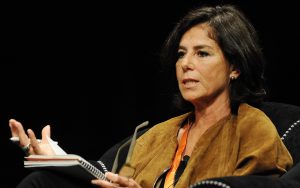Lucrezia Reichlin: Data Pioneer Hopes for a New Era of Economic Co-operation

London Business School economics Professor &
Now-Casting Economics Chairman & Co-founder: Lucrezia Reichlin
Italian economist Lucrezia Reichlin is recognised as one of the pioneers of big data.
Reichlin made history as the first female director-general of research at the European Central Bank (ECB), and currently teaches economics at London Business School.
The Rome native decided to pursue economics at an early age. “Economics is a part of everybody’s life,” she says, “so it is important to understand how income is generated, how it is distributed, how an economy grows, or why some economies are doing better than others, why some countries are doing better than others.”
Reichlin left Italy to complete a doctorate programme at New York University then went on to teach at the Université Libre de Bruxelles for 10 years. It was there, with her colleague and future co-founder Domenico Giannone, that she began the research that led to the foundation of her economics company, Now-Casting.
The two academics coined an economic term with their title (“now-casting” is a contraction of now and forecasting) and provided a methodology for its implementation. Now-casting is defined as the prediction of the present and the very near future, and an analysis of the very recent past. “More broadly we can define it as the exercise of reading, through the lenses of a model, the flow of data-releases in real time,” Reichlin explains.
Policy makers and private investors trust Now-Casting to create accurate and timely economic forecasts from a diverse collection of hard and soft data-input sources, incorporating everything from employment figures and industrial surveys to consumer feedback and social-media posts. It’s a fully automated process which continuously updates.
“If there is a signal to be picked up in the economic data-flow, the Now-Casting model tends to pick it up weeks or months before other forecasts,” the company says. The service provides “a clear and up-to-the-minute gauge of the real economy” as well as “a transparent and quantitative way to read the news flow”.
Today, Reichlin is a non-executive member of AGEAS Insurance Group and Messaggerie Italiane, as well as a trustee of the International Financial Reporting Standards and the Centre for Economic Policy Research. She is also a fellow of prestigious institutions such as the British Academy, and is a regular contributor to international publications. Her cross-sector experience in academia, policymaking and private enterprise gives depth and clout to her opinion.
“The current geopolitical context should reinforce Europe’s motivation to bolster its crisis-management capacity,” Reichlin warned in the pages of the Project Syndicate media organisation. She reminded readers of the international co-operation that predominated when the US and Europe were on friendlier terms, and currency swap lines could be quickly established to stabilise economies.
“Today, by contrast, isolationism is on the rise, with the US taking the lead,” she wrote in March. “The US Federal Reserve consulted no one before implementing its recent emergency interest-rate cut. One shudders to think what would happen if European banks urgently needed dollar funding in this context.”
The pandemic has caused shockwaves for families, industries, and social liberties. It has affected every aspect of our lives, and Reichlin believes the road to recovery will be a long one.
“The COVID-19 crisis has laid bare our lack of resilience, not only in terms of health, but also with regard to the environment and social protection,” she says. “Given this, the EU needs to invest not only in supporting economic recovery, but also in building a more resilient society based on our core values.
“Despite European countries’ shortcomings, they lead the world in terms of social protection and individual rights. They should build on these strengths in order to create fairer, smarter, more sustainable societies. Every aspect of the EU’s pandemic-response strategies should be designed with an eye toward those goals.
“The European Union has always advanced on the back of crises. In this sense, the COVID-19 outbreak could represent a chance for the EU to create a powerful crisis-management mechanism, which pools members’ resources and channels them toward a co-ordinated fiscal policy.”
You may have an interest in also reading…
World Exchanges Agree Enhanced Sustainability Guidance
Guidance is culmination of year-long project by WFE’s Sustainability Working Group WFE sets out ‘material ESG metrics’ to include in
Hugging Hero is Embracing the World
Mata Amritanandamayi is an Indian spiritual leader known as ‘Mother’ and many regard her as a saint. Her message is
Intersolar Europe 2013: Cost effective PV Solutions at Display
An increasing number of German companies are investing in renewable energy sources, such as photovoltaics (PV), to provide their own


















































































